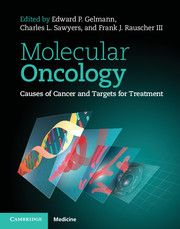Book contents
- Frontmatter
- Dedication
- Contents
- List of Contributors
- Preface
- Part 1.1 Analytical techniques: analysis of DNA
- Part 1.2 Analytical techniques: analysis of RNA
- Part 2.1 Molecular pathways underlying carcinogenesis: signal transduction
- Part 2.2 Molecular pathways underlying carcinogenesis: apoptosis
- Part 2.3 Molecular pathways underlying carcinogenesis: nuclear receptors
- Part 2.4 Molecular pathways underlying carcinogenesis: DNA repair
- Part 2.5 Molecular pathways underlying carcinogenesis: cell cycle
- Part 2.6 Molecular pathways underlying carcinogenesis: other pathways
- Part 3.1 Molecular pathology: carcinomas
- Part 3.2 Molecular pathology: cancers of the nervous system
- Part 3.3 Molecular pathology: cancers of the skin
- Part 3.4 Molecular pathology: endocrine cancers
- Part 3.5 Molecular pathology: adult sarcomas
- Part 3.6 Molecular pathology: lymphoma and leukemia
- Part 3.7 Molecular pathology: pediatric solid tumors
- Part 4 Pharmacologic targeting of oncogenic pathways
- Index
Preface
Published online by Cambridge University Press: 05 February 2015
- Frontmatter
- Dedication
- Contents
- List of Contributors
- Preface
- Part 1.1 Analytical techniques: analysis of DNA
- Part 1.2 Analytical techniques: analysis of RNA
- Part 2.1 Molecular pathways underlying carcinogenesis: signal transduction
- Part 2.2 Molecular pathways underlying carcinogenesis: apoptosis
- Part 2.3 Molecular pathways underlying carcinogenesis: nuclear receptors
- Part 2.4 Molecular pathways underlying carcinogenesis: DNA repair
- Part 2.5 Molecular pathways underlying carcinogenesis: cell cycle
- Part 2.6 Molecular pathways underlying carcinogenesis: other pathways
- Part 3.1 Molecular pathology: carcinomas
- Part 3.2 Molecular pathology: cancers of the nervous system
- Part 3.3 Molecular pathology: cancers of the skin
- Part 3.4 Molecular pathology: endocrine cancers
- Part 3.5 Molecular pathology: adult sarcomas
- Part 3.6 Molecular pathology: lymphoma and leukemia
- Part 3.7 Molecular pathology: pediatric solid tumors
- Part 4 Pharmacologic targeting of oncogenic pathways
- Index
Summary
This book was conceived more than five years before its publication date. It was intended to provide a resource that summarized technology, biochemistry, molecular pathophysiology, and targeted therapeutics. As contributors were being recruited and chapters written the field that was being described changed at an accelerating pace. It is a tribute to scientific progress that volumes like this are out-of-date as they are published, but books like this are not meant to contain the most current laboratory discovery or report the most recent FDA approval.
While this book was being written there have been major advances in molecular oncology. The Cancer Genome Atlas (cancergenome.nih.gov) has demonstrated the broad spectrum of mutations in an expanding list of cancers. DNA sequence analysis alone has demonstrated that as cancers grow, metastasize, and develop treatment resistance, individual tumor sites within a single patient evolve differently and demonstrate increasingly complex spectra of driver and passenger mutations. These findings alone strongly support the Darwinian view of tumor progression. The complexities of cellular dysregulation in cancer may arise from DNA sequence changes, but extend to other levels of gene regulation. During the writing of this book the role of micro-RNAs (miRNAs) in cancer was elucidated. Aberrations in epigenetics such as DNA methylation and histone acetylation were demonstrated. Cancer drug development has also proceeded at increasing rates. In the period 2008–2012 there were 51 approvals of new drugs for cancer treatment by the US Food and Drug Administration. Many of these approvals resulted from impressive data in Phase II trials that clearly demonstrated efficacy where no agents have worked before.
- Type
- Chapter
- Information
- Molecular OncologyCauses of Cancer and Targets for Treatment, pp. xxi - xxiiPublisher: Cambridge University PressPrint publication year: 2013



